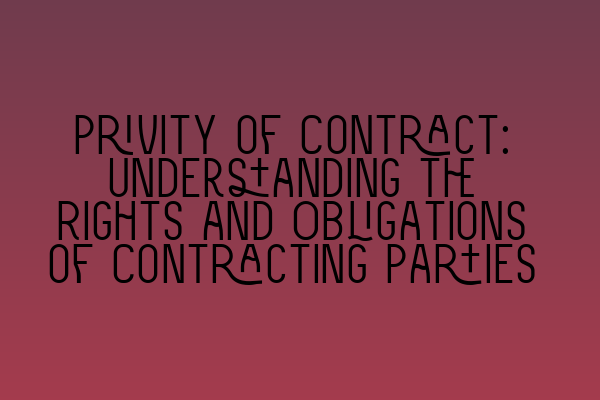Privity of Contract: Understanding the Rights and Obligations of Contracting Parties
In the world of contract law, one key concept that is often discussed is the doctrine of privity of contract. This principle determines the rights and obligations of the parties involved in a contract and plays a crucial role in the enforcement and interpretation of contractual agreements.
To put it simply, the doctrine of privity of contract refers to the idea that only the parties to a contract have rights and obligations under it, and that third parties cannot enforce or be bound by the terms of the contract. This means that if you are not a party to a contract, you generally cannot sue or be sued based on that contract.
Let’s dive deeper into the concept of privity of contract and explore its implications.
1. The Parties to a Contract:
The first step in understanding privity of contract is identifying the parties to a contract. Typically, there are two main parties involved: the promisor and the promisee. The promisor is the party who makes a promise, while the promisee is the party to whom the promise is made. These parties are usually the ones who have direct rights and obligations under the contract.
For example, imagine a scenario where John promises to sell his car to Jane for a certain price. Here, John is the promisor and Jane is the promisee. They are the primary parties to the contract and will have legal rights and obligations concerning the car sale.
2. The Doctrine of Privity:
The doctrine of privity of contract establishes the general rule that only the parties to a contract have rights and obligations under it. This means that a third party, someone who is not involved in the contract, does not have the ability to sue or be sued based on that contract.
Let’s take our previous example of John and Jane. If John fails to sell the car to Jane as promised, Jane can legally take action against him because she is a party to the contract. However, if a friend of Jane’s named Sarah was promised the car instead of Jane, Sarah would not have the legal right to enforce that promise because she is not involved in the contract. Privity of contract protects John from facing legal consequences from someone who is not directly part of the agreement.
3. Exceptions to Privity of Contract:
While the general rule is that only the parties to a contract have rights and obligations, there are some exceptions to the doctrine of privity. These exceptions allow certain third parties to enforce or be bound by the terms of a contract.
One common exception is when the parties intend to create a contract for the benefit of a third party. This is known as a third-party beneficiary contract. In such cases, the third party can enforce the contract if it can be shown that the parties intended to confer a benefit upon that party.
Another exception is when a statutory provision overrides the doctrine of privity. Some laws give certain rights and remedies to third parties, even if they are not party to the contract. These provisions can vary depending on the jurisdiction and the specific legislation in place.
Understanding the exceptions to privity of contract is crucial for solicitors and legal professionals. It allows them to identify situations where a third party may have rights or obligations under a contract, and effectively advise their clients accordingly.
4. Practical Implications:
The doctrine of privity of contract has significant practical implications for businesses and individuals involved in contractual agreements. It protects parties from being sued by individuals who are not directly involved in the contract and ensures that only those parties who have agreed to be bound by the terms of the contract are legally obligated.
For instance, consider a construction project where the main contractor enters into contracts with various subcontractors. The subcontractors will have rights and obligations only with respect to the main contractor and not to other subcontractors. Privity of contract prevents subcontractors from holding each other liable for any breaches or failures in performance.
5. Conclusion:
In conclusion, privity of contract is a fundamental principle in contract law that defines the rights and obligations of the parties involved in a contract. While the doctrine generally limits the ability of third parties to enforce or be bound by the terms of a contract, there are exceptions to this rule.
Understanding the concept of privity of contract is crucial for contract lawyers and legal professionals. By being aware of the parties to a contract and the exceptions to privity, solicitors can provide accurate and informed advice to their clients and ensure that contractual agreements are properly understood and enforced.
To learn more about contract law and prepare for your SQE exams, check out these related articles:
– [SQE 1 Practice Exam Questions](https://fqps.co.uk/sqe/sqe1-preparation/mcq-practice-quiz)
– [SQE 1 Practice Mocks FLK1 FLK 2](https://fqps.co.uk/sqe/sqe1-preparation/practice-mocks-quiz)
– [SQE 2 Preparation Courses](https://fqps.co.uk/sqe/sqe2-preparation)
– [SQE 1 Preparation Courses](https://fqps.co.uk/sqe/sqe1-preparation)
– [SRA SQE Exam Dates](https://fqps.co.uk/sqe/sqe1-sqe2-exam-dates)
Continuing to build your knowledge and understanding of contract law will enable you to excel as a solicitor and navigate the complexities of privity of contract with confidence.
